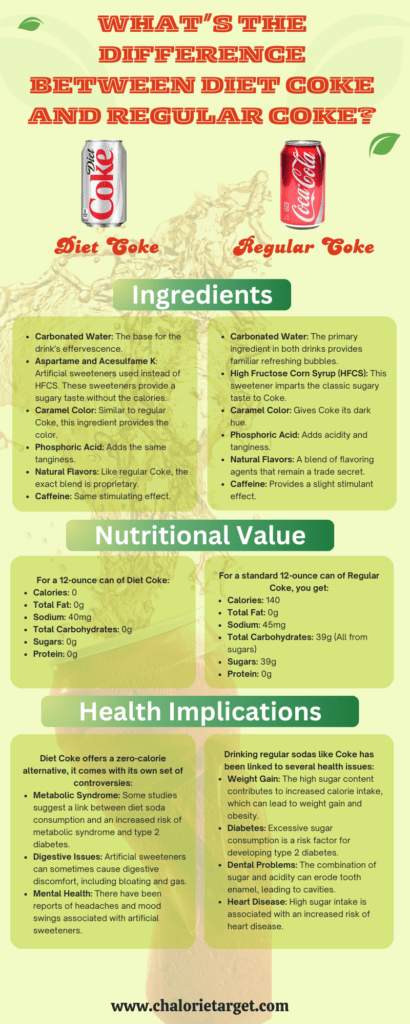In the world of carbonated beverages, Coca-Cola reigns supreme. Over the decades, it has evolved into a refreshment symbol, with variations catering to diverse consumer preferences.
Among these versions, Diet Coke has carved out a significant niche. But what exactly separates Diet Coke from its classic counterpart? You’re not alone if you’ve ever wondered about the difference between diet coke and coke.
To answer that very question, this article dives deep into the ingredients, nutritional values, taste profiles, and health implications of Diet Coke and Regular Coke.

1. The Ingredients
a. Regular Coke
The original Coca-Cola formula has been a closely guarded secret since 1886. However, we do know the essential ingredients that give Coke its distinctive taste and fizz:
- Carbonated Water: The primary ingredient in both drinks provides familiar refreshing bubbles.
- High Fructose Corn Syrup (HFCS): This sweetener imparts the classic sugary taste to Coke.
- Caramel Color: Gives Coke its dark hue.
- Phosphoric Acid: Adds acidity and tanginess.
- Natural Flavors: A blend of flavoring agents that remain a trade secret.
- Caffeine: Provides a slight stimulant effect.
b. Diet Coke
Diet Coke was introduced in 1982 as a sugar-free alternative catering to health-conscious consumers. Its ingredients are slightly different:
- Carbonated Water: The base for the drink’s effervescence.
- Aspartame and Acesulfame K: Artificial sweeteners used instead of HFCS. These sweeteners provide a sugary taste without the calories.
- Caramel Color: Similar to regular Coke, this ingredient provides the color.
- Phosphoric Acid: Adds the same tanginess.
- Natural Flavors: Like regular Coke, the exact blend is proprietary.
- Caffeine: Same stimulating effect.
c. Health Implications of Ingredients
The most significant difference here lies in the sweeteners. High Fructose Corn Syrup (HFCS) in Regular Coke has been linked to various health issues, including obesity and diabetes.
On the other hand, the artificial sweeteners in Diet Coke, such as Aspartame and Acesulfame K, are controversial. While the FDA deems them safe, some studies suggest potential adverse effects, including headaches and even an increased risk of metabolic syndrome.
Read More: How Fast Can You Lose Weight on the Carnivore Diet?
2. Nutritional Value
a. Regular Coke
For a standard 12-ounce can of Regular Coke, you get:
- Calories: 140
- Total Fat: 0g
- Sodium: 45mg
- Total Carbohydrates: 39g (All from sugars)
- Sugars: 39g
- Protein: 0g
b. Diet Coke
For a 12-ounce can of Diet Coke:
- Calories: 0
- Total Fat: 0g
- Sodium: 40mg
- Total Carbohydrates: 0g
- Sugars: 0g
- Protein: 0g
c. Nutritional Differences and Health Impact
The clear distinction is the absence of calories and sugars in Diet Coke. For those watching their caloric intake or managing conditions like diabetes, this can make Diet Coke a more attractive option. However, the long-term health effects of artificial sweeteners remain a topic of ongoing research and debate.
3. Taste and Flavor
a. Regular Coke
The taste of Regular Coke is often described as sweet and rich, with a balanced acidity and a slight caramel undertone. The sweetness comes from the high fructose corn syrup, which provides a full-bodied mouthfeel.
b. Diet Coke
Diet Coke has a lighter, crisper taste compared to its sugary counterpart. Artificial sweeteners like Aspartame and Acesulfame K give it a different flavor profile. Some people detect a slightly metallic aftertaste, which can be attributed to the sweeteners used.
c. How Sweeteners Affect Flavor Perception
Artificial sweeteners are much sweeter than sugar, which means less is needed to achieve the desired sweetness. However, this can also alter the flavor profile, distinguishing it from Regular Coke. Additionally, the lack of sugar changes the mouthfeel and aftertaste, contributing to the unique experience of drinking Diet Coke.
4. Health Implications
a. Regular Soda Consumption
Drinking regular sodas like Coke has been linked to several health issues:
- Weight Gain: The high sugar content contributes to increased calorie intake, which can lead to weight gain and obesity.
- Diabetes: Excessive sugar consumption is a risk factor for developing type 2 diabetes.
- Dental Problems: The combination of sugar and acidity can erode tooth enamel, leading to cavities.
- Heart Disease: High sugar intake is associated with an increased risk of heart disease.
b. Diet Soda Consumption
While Diet Coke offers a zero-calorie or calorie free alternative, it comes with its own set of controversies:
- Metabolic Syndrome: Some studies suggest a link between diet soda consumption and an increased risk of metabolic syndrome and type 2 diabetes.
- Digestive Issues: Artificial sweeteners can sometimes cause digestive discomfort, including bloating and gas.
- Mental Health: There have been reports of headaches and mood swings associated with artificial sweeteners.
c. Studies and Controversies
Numerous studies have been conducted on both types of sodas. Regular Coke’s high sugar content is universally considered to create health problems when consumed in large amounts.
While free from sugar, Diet Coke has been scrutinized for its artificial sweeteners. The FDA maintains that these sweeteners are safe for consumption, but ongoing research continues to explore their long-term effects.
Read More: What is a Carb Consistent Diet
5. Consumer Preferences
a. Why Choose Regular Coke?
- Taste: Many people prefer the taste of Regular Coke, citing its richer, fuller flavor.
- Nostalgia: Regular Coke has a long-standing history and brand loyalty that appeals to many.
- Perception of Naturalness: Despite its high sugar content, some consumers perceive Regular Coke as more “natural” than Diet Coke, which contains artificial sweeteners.
b. Why Choose Diet Coke?
- Health Consciousness: Drinking diet soda appeals to those looking to reduce their caloric and sugar intake.
- Dietary Restrictions: People with conditions like diabetes may opt for Diet Coke as a safer alternative.
- Flavor Varieties: Diet Coke offers more flavor options than Regular Coke, appealing to a broader audience.
c. Market Trends and Consumer Behavior
Market trends show a growing preference for low-calorie and sugar-free options as health consciousness rises among consumers. This shift has led to an increase in the availability and popularity of diet beverages. However, the nostalgic and traditional appeal of Regular Coke ensures it remains a staple in the beverage market.
6. Conclusion
In summary, Regular Coke and Diet Coke have unique attributes and appeal to different consumer needs. Regular Coke offers a rich, sugary flavor that many love, but it comes with significant health risks when consumed in excess.
Diet Coke provides a zero-calorie alternative, making it attractive for those looking to cut down on sugar and manage their weight. Still, it also carries its controversies, particularly around its artificial sweeteners.
Ultimately, the choice between Diet Coke and Regular Coke comes down to personal preference and health goals.
